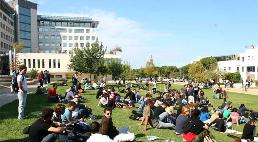|
| Education System in Israel |
Primary Education
Israel is a complex society with tensions between state and religion, and the cultural rights of jews and arabs. Notwithstanding this, the state curriculum is standardized by the ministry of education and culture who allow few exceptions. The academic year runs from september through to july 6 days a week, and the teaching medium is either Arabic or Hebrew. Education is compulsory and free (although some materials must be bought).Two years of nursery school are prescribed by law, as are the 8 years of primary education that follow. Here pupils learn the academic basics, as they prepare perhaps for the form of secondary education they may follow.
Secondary Education
Four years of secondary education follow, all of which are free although only the first two are compulsory. Academic high schools prepare students for university, while comprehensive high schools provide a combination of academic and vocational training.Vocational Education
Vocational high schools either prepare students for practical careers, or provide the grounding for technical tertiary study for example in engineering and science. They are well-equipped and are feeders to the nation’s industrial strength.Tertiary Education
 There are seven Israeli universities for which students must pass the bagrutentrance examination to enter. Other post-secondary institutions provide teaching and nursing training, as well as preparation for other technical and semi-professional careers.
There are seven Israeli universities for which students must pass the bagrutentrance examination to enter. Other post-secondary institutions provide teaching and nursing training, as well as preparation for other technical and semi-professional careers. The nation’s oldest university is the Israel Institute of Technology, which has educated 3 generations since being founded in 1924. It offers degrees in science and engineering, and architecture, industrial management, medicine and technical education too.
